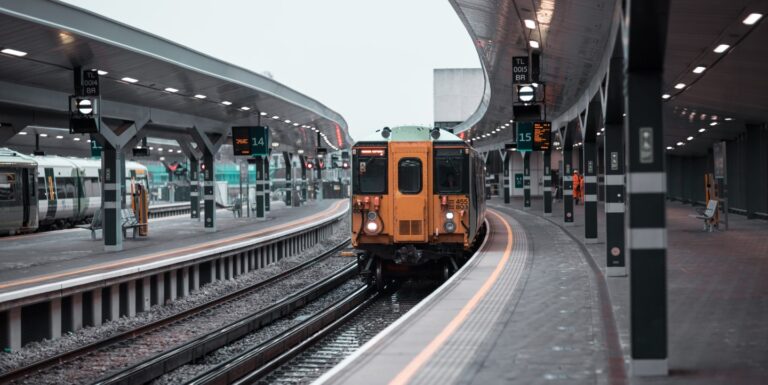Do the trains need retraining?
In the first few days of 2017, the story of Anne Wafula Strike, an award-winning Paralympian and MBE, hit the news.
Anne Wafula Strike train debacle
Anne is a Paralympic wheelchair racer who competed at the 2012 London Games. Anne contracted polio at the age of 2, leaving her paralysed from T7.
The wheelchair accessible toilet on the train that Anne was on was out of order. As a wheelchair user who is paralysed, Anne could not simply go off and use one of the other toilets. Even if she had been able to get into another toilet, accessing it would have been difficult – her wheelchair would not fit down the aisle of the train, or into the next carriage, to allow her to get to one. Anne decided that she was going to get off at the next stop simply so she could use the wheelchair accessible toilet at the station, despite the fact that this would cause her journey to be delayed. However, as this was an “unscheduled arrival” of a wheelchair user needing assistance, there were no available staff at the station to help Anne get off the train and on to the next train so she could continue her journey. This left Anne with no choice but to remain on the train, and in a sad twist of irony, on the carriage with the out of order wheelchair accessible toilet. There was nothing Anne could do but wet herself on the train.
The Kenyan-born athlete described the experience as humiliating and said that it had robbed her of her dignity. Anne added that “having access to a toilet, especially in a developed nation like the UK, is one of the most basic rights.”
Since the story hit the news, fellow Paralympian Ade Adepitan and actress Samantha Renke have come forward to also talk about their own experiences of being on a train without access to a wheelchair accessible toilet.
These stories are distressing to read, and must have been simply awful for those living through problems such as these on a daily basis. I find it incredibly painful to hear stories like this in this day and age.
What are train companies doing to improve disabled toilet access?
Anne went public with her story, highlighting the problem with access to toilets for those with disabilities. As a result, a meeting was arranged between the government and the rail industry. Following the talks, which were between Paul Maynard, the Rail Minister, and senior rail industry representatives, the rail industry has committed to improve accessibility for disabled passengers.
- Upgrade and adapt stations
To date, more than 150 stations nationwide have been upgraded under the “Access for All programme” to remove barriers to independent travel. The adaptations have included installing signs, ramps and lifts. A further 68 stations are in construction or under development. But with 2,552 train stations in the UK, can anyone really say that this is enough?
- Improve on-train toilet facilities
It has been a requirement since 1999 that all new trains which offer toilet facilities must also include an accessible toilet as standard. All trains built before 1999 must be adapted so they are compliant by 2020.
Since the government met with the rail industry, it has been reported that work to improve disabled access to toilets on trains and at stations is already underway.
- Improve communication at all levels
The improvements will include:
- Clearer information regarding the availability of accessible toilets in advance of journeys;
- Improving staff training where possible; and
- Maintenance teams to ensure accessible toilets are more reliable in the first place and to fix them faster when problems arise.
Where facilities are out of order, disabled passengers should, at the very least, be informed of this before the train departs. This will enable disabled passengers to make an informed decision about whether they want to, or are able to, travel on the train without access to a working, wheelchair accessible, toilet.
Customer Service can make all the difference…
The head of the Spinal Injuries Team, a wheelchair user herself, has also experienced an out of order wheelchair accessible toilet on a train. This happened when Raquel was travelling from London to Manchester in 2016. The difference with the customer service Raquel received was that the she was informed that the wheelchair accessible toilet in standard class was broken before she boarded and, in addition, she was offered a free upgrade to first class where the wheelchair accessible bathroom was working. This is an example of excellent customer service, and an example of what train companies could do to rectify any “out of order” signs on wheelchair accessible toilets.
Recent landmark decision is failing those it intended to protect
The recent decision in Paulley v FirstGroup, handed down by the Supreme Court on 18 January 2017, does not seem to be having the effect that many were led to believe it would. About a week after the judgment, it was reported that Kirsty Shepherd, a wheelchair user, was denied access to a bus by the bus driver because there was a buggy already on the bus. This was despite the fact that the woman, whose buggy was in the wheelchair space, said she would be willing to move. As a result, not only was the bus delayed whilst the driver radioed through to management, the bus journey was terminated simply because the driver would not, for whatever reason, allow a wheelchair user was access to public transport. On these facts, the bus driver’s training clearly fell below acceptable standards, let alone the common-sense failings that seem to have prevailed.
This goes beyond being able to simply board a bus; Kirsty, or any other wheelchair user, may be travelling to work, or to a doctor’s appointment, or even simply be trying to get home safely. I apologise for pointing out the obvious, but many wheelchair users cannot walk to their destination; they cannot use tube and train stations that do not have lifts; sometimes, they cannot even get a taxi even if they can go to the expense of paying for one.
The Equality Act 2010, and the recent judgment in Paulley v FirstGroup, should provide disabled people with, as far as possible, equal opportunities to use public infrastructure. Those with disabilities are expected to, and often want to, contribute to society and pay their taxes. But they are not able to reap the benefits of public services in the same way.
What more can transport companies do?
- Be more flexible
One of the particular frustrations of using public transport for someone with mobility restrictions is the train companies’ requirement that assistance is booked 24 hours in advance. This process can be stressful, and involve a number of telephone conversations. It also takes the spontaneity out of travelling. Being able to alleviate this barrier to independent travel would benefit disabled travellers.
- Prioritise good communication
They say too much knowledge can never be a bad thing. And that is true for disabled people using public transport; using routes that you know have good access and assistance should make a journey less stressful. But this isn’t always possible and staff at stations could be better informed to help disabled travellers get around.
This is even more important when things go wrong; a train is delayed, there is an overhead wiring problem or the lift at the station has broken down. In any scenario which means a journey may need to be rerouted, the station staff should have the knowledge to advise disabled passengers on other suitable routes. This could avoid disabled passengers being stranded at stations or having excessively long and tiring journeys.
And that is just for starters.
Is help on the way?
The Department for Transport will be publishing its ‘Accessibility action plan’ later this year, which will address accessibility across all modes of public transport.
But will the proposed action plan, even when it is combined with the action already being taken by transport companies, be enough?
As with most things, I think this we will need to wait and see what happens. Personally, given the limited impact that Paulley v FirstGroup has had, unless Parliament sets these matters down in legislation or makes it easier to enforce one’s rights under the Equality Act, I think little will actually change in reality.
But it should. These matters are important to ensure equality for all, and the transport system is just one of the places where equality needs to mean equality. Not everyone will understand the impact that a lack of access can have and, in my opinion, we really do need the government to start stepping in to tackle these issues.
But for now, I will eagerly await the ‘Accessibility action plan’ and see what impact this will have on making transport in the UK more accessible for all.
In the meantime, if everyone continues promoting, discussing and supporting these issues, hopefully the train operating companies and government will continue to make this a priority.










